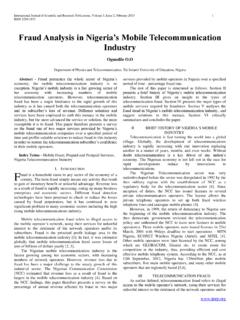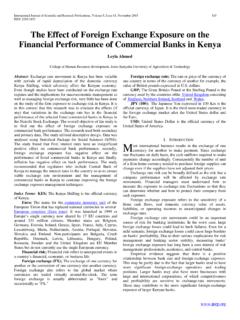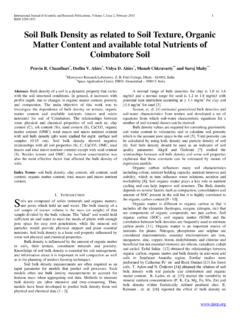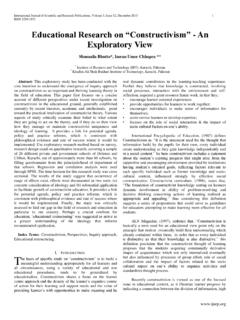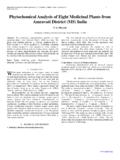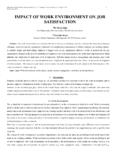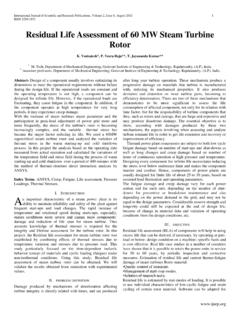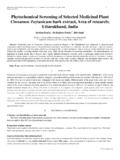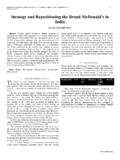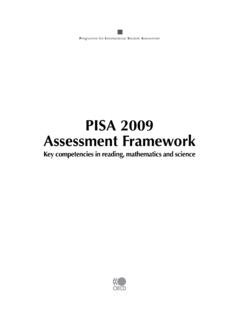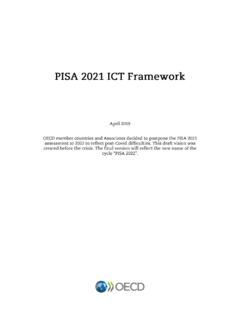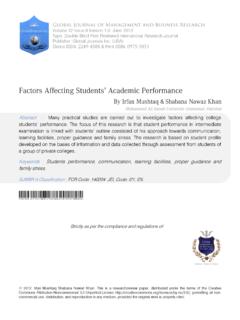Transcription of Factors Affecting the Mathematics Problem Solving Skills ...
1 International Journal of Scientific and Research Publications, Volume 8, Issue 2, February 2018 487 ISSN 2250-3153 Factors Affecting the Mathematics Problem Solving Skills of Filipino Pupils A Study Conducted in Kiamba Central School SPED Center, Kiamba, Sarangani Isabelo V. Silao, Jr.* * Kiamba Central School SPED Center, Kiamba, Sarangani, Philippines Abstract - Striving for excellence in Mathematics attracted the researcher to determine the Factors Affecting the Mathematics performance of Kiamba SPED Center pupils. Descriptive-correlation study was conducted in order to determine the level of the pupils' mastery in math basic Skills , attitude towards Mathematics and their parents' involvement in learning, and which of these Factors have significant relationship with Problem Solving Skills .
2 Respondents were the Grades lV, V, and Vl pupils of Kiamba Central School SPED Center, consisting of 95 pupils from the Fast-Learner section. The instruments used were the Basic Skills Test, the Attitude Scale Test, Parental Involvement Questionnaire and the Problem Solving Test. Numerical scores were assigned to responses in the five-point Likert Scale in the Attitude Scale, and the mean score subsequently computed. Chi-square test was used to determine the significance of the relationship between the pupils' Problem Solving Skills and the three Factors tested.
3 The result of the study showed that there is a significant relationship between the Problem Solving Skills and the pupils' mastery of basic Skills , attitude towards Mathematics , and parental involvement. Index Terms - Factors Affecting , Mathematics , Problem Solving Skills , Kiamba SPED Center I. INTRODUCTION he present study sought to find out the relationship of selected variables believed to have significant bearing on the Mathematics performance of pupils. The framework of the study focuses on mastery of basic Skills and attitude towards Mathematics as pupil Factors and the parents' involvement in their children's learning activities as parent factor that may affect the Problem Solving Skills of the pupils.
4 Significance of the Study An important objective in teaching Mathematics is to develop students ' mathematical Problem - Solving Skills . The researcher, a Mathematics Coordinator, considers this endeavor to be of help to school administrators, teachers, parents, and pupils in improving the Mathematics performance of learners and to other future researchers. Research Questions The study sought to answer the following questions 1. What is the demographic profile of pupils in terms of: Basic Skills Test: and, Attitude Scale Test? 2. What is the demographic profile of the parents in terms of Parental Involvement in the pupil learning?
5 3. What is the extent of the pupils' Problem Solving Skills ? 4. Is there a significant relationship between the pupils' Problem Solving Skills and the pupil faders when analyzed according to: Basic Skills ; and. Attitude? 5. Is there a significant relationship between the pupils' Problem Solving Skills and the parent factor when analyzed according to Parental Involvement? Hypotheses H01: There is no significant relationship between the pupils' mastery of basic Skills and the pupils' Problem Solving Skills . T International Journal of Scientific and Research Publications, Volume 8, Issue 2, February 2018 488 ISSN 2250-3153 H02: There is no significant relationship between the pupils' attitude towards Mathematics and the pupils' Problem Solving Skills .
6 H03: There is no significant relationship between parental involvement and the pupils' Problem Solving Skills . Definition of Terms For better understanding of the concepts and terms in this study, the following words are defined operationally. Attitude is used to mean the pupil's interest in Mathematics , like or dislike of the subject. In this study, it was measured using the Attitude Scale Test. A pupil's attitude may be highly positive, positive, fair, negative or highly negative. Basic Skills , operationally is used to refer to the pupil's ability to use the four fundamental operations in whole numbers, decimals, fractions, and percentage.
7 In this study, it was measured with the Basic Skills Test. Parent Involvement is used to refer to the activities and behavior of parents that support the pupils' learning process. Performance level is the quotient of the grade IV, V, and VI pupils' score divided by the perfect score and then multiplied by 100. This is then categorized as Mastered, Nearly Mastered, and Not Mastered based on the standard set in the National Achievement Test given annually to Grades III and VI. Problem Solving is the process used to obtain a solution to a Mathematics question. In this study, it is measured with the Problem Solving Test.
8 Pupil Factors refer to the characteristics or attitudes of the pupils that influence them to develop or hinder their mastery of the basic Mathematics Skills . SPED Center pupils are the Grades IV, V, and VI pupils belonging to SPED Fast-Learner section of Kiamba Central School SPED Center. II. REVIEW OF RELATED LITERATURE Related Local Studies Buan (1997) tested other variables possibly related to Mathematics achievement and attitude. It was aimed to compare the effects of cooperative and individualistic instructions on student's achievement in Mathematics and their attitude towards the subject.
9 It was found that there is a significant difference in the pre-test and posttest scores of the cooperative group in the achievement test and attitude scale. In the individualistic group there is a significant difference in the pre-test and post-test achievement scores only but there is no significant change in attitude scores. Angay's (1998) research work on pupils' difficulties in basic operations involving fraction concluded that the pupils performed poorly in the four fundamental operations of fractions. Moreover, the finding showed that there is a significant difference between the pupils' achievement and their parents' educational attainment.
10 According to Lucero (1999), parental involvement was significantly correlated with both pupils' Mathematics achievement and attitudes. Mathematics achievement was significantly correlated with both father's education and Mathematics attitudes; while Mathematics attitude was significantly correlated with parents' monthly income. Bigornia (2000) determined the Factors Affecting the mathematical proficiency level of Grade VI pupils. teacher competence, pupils' background and communication Skills were found to have highly significant relationship with pupils' Mathematics achievement.
